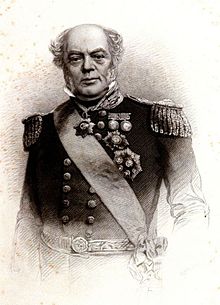James Whitley Deans Dundas
Sir James Whitley Deans Dundas , GCB ( December 4, 1785 - October 3, 1862 in Weymouth , Dorset ) was a British naval officer during the Crimean War .
family
He was born as the son of Dr. James Deans and Janet Dundas were born. On April 2, 1808 he married his cousin Janet, the only daughter of Charles Dundas (later Baron Amesbury) and took the surname Dundas . The couple had five children and his wife inherited large estates in Flintshire and Berkshire . After the death of his wife in April 1846, Lady Emily Moreton († 1900) became his second wife in August 1847.
Naval career
Dundas joined the Royal Navy on December 4, 1799. After six years of service in the Mediterranean , the French west coast and the North Sea , he was promoted to lieutenant on the HMS Cambrian by Admiral George Keith Elphinstone on May 25, 1805 . The following year he served a few weeks under Admiral George Cranfield Berkeley before 1806 on October 8 Commander was. In 1809 he was given command of the HMS Statley (→ coalition wars ).
Between 1815 and 1819 he commanded the HMS Tagus in the Mediterranean. From 1830 to 1832 Sir William Parker's flag captain was on board the HMS Prince Regent , which was off Portugal . In the same position he was from 1836 to 1838 under Sir Philip Durham on board the HMS Britannia with home port Portsmouth . On October 25, 1839, he was accepted as a Companion in the Order of the Bath .
The promotion to Rear Admiral took place on November 23, 1841. From June 25 to September 8, 1841 he was Fourth Sea Lord, from July 13, 1846 to July 20, 1847 Second Sea Lord and finally from July 20, 1847 to February 13 1852 First Sea Lord (Military Commander in Chief of the Royal Navy). He took command of the Mediterranean Fleet in January 1852 and became Vice Admiral on December 17, 1852 .
Crimean War
After the outbreak of the Crimean War in 1854, he directed the transport of British troops to the Crimea and their supplies.
The failure in the attack on the Sevastopol fortifications on October 17, 1854, among other shortcomings in British warfare, was heavily criticized by the domestic press, notably in reports by William Howard Russell in The Times .
In January 1855 he was routinely replaced by his deputy Sir Edmund Lyons and returned to England. On July 5, 1854, he was knighted as Knight Grand Cross of the Order of the Bath. The British allies also honored him with the Grand Cross of the Legion of Honor ( France ) and the Mecidiye Order, first class ( Ottoman Empire ).
Last years
Dundas was promoted to admiral on December 8, 1857 , but was released from active service. He represented the Greenwich constituency for four terms in the House of Commons as a member of the Liberals .
Dundas was buried in Kintbury, Berkshire .
| personal data | |
|---|---|
| SURNAME | Dundas, James Whitley Deans |
| BRIEF DESCRIPTION | British admiral and politician |
| DATE OF BIRTH | December 4, 1785 |
| DATE OF DEATH | October 3, 1862 |
| Place of death | Weymouth |
